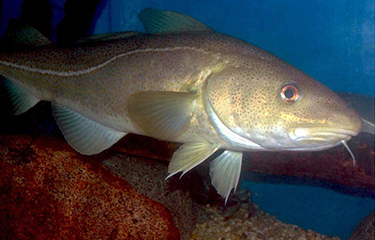New genetic evidence suggests the overfishing of cod in the 1900s led the fish to rapidly evolve over decades, according to a study led by Rutgers University.
The study, published in the Philosophical Transactions of the Royal Society B: Biological Science, shows that the collapse of cod stocks in the Atlantic due to overfishing may have spurred genetic changes that were previously thought to take place over millions of years.
“We have now been able to demonstrate that many genes throughout the genome did shift in the same way in cod from both sides of the Atlantic Ocean over the past 100 years,” Brendan Reid, one of the authors and a postdoctoral associate in Rutgers' department of ecology, evolution, and natural resources. “This suggests that cod did indeed evolve in response to fishing through small changes in many genes, something we didn’t have clear evidence for before in any overfished species.”
While scientists had recorded that cod were changing to mature and reproduce earlier, they had been unable to identify transformations in key genes. The new study took a different angle, looking for small changes over many genes instead of a few large changes in a couple genes. Using new techniques, the study’s authors were able to identify those small changes and link cod’s recent changes to human fishing.
“The discovery was made possible by new technology that allowed us to extract and read the genetic code of cod, some caught more than 110 years ago, as well as new analytical techniques that detect subtle changes in that genetic code,” Rutgers Associate Professor Malin Pinsky said.
Pinsky was also one of the authors of a study published in Proceedings of the Royal Society B in April outlining how climate-driven changes to food web relationships could change over time.
For the cod study, the authors said their findings suggest the species will be able to revert to larger sizes as the population rebounds.
“Since evolution in response to fishing happened through lots of small changes in many genes rather than large changes in one or two genes, and cod have maintained most of their genetic diversity, it will be easier for cod to evolve back towards their previous pattern of slower growth at large sizes,” Reid said. “The fact that cod populations are rebounding and shifting back towards previous patterns of growth suggests, given proper management, this fishery can return to its previous state and provide a sustainable source of food for a large number of people and a source of income for coastal communities that heavily depend on fishing.”
Regulators continue to work towards restoring Atlantic cod fisheries after their collapse in the 1990s. The New England Fishery Management Council (NEFMC) is planning to keep cod catch limits low for the next decade as they attempt to balance the needs to commercial fishermen with rebuilding the Gulf of Maine cod stock.
“The stock is classified ‘overfished,’ meaning the biomass is below where it should be, with ‘overfishing occurring,’ meaning fishing mortality is too high, since 2011, as well as in some of the years before that,” NEFMC Spokesperson Janice Plante said. “The council could have selected a shorter rebuilding time, but that would have led to deeper cuts to commercial catches and recreational fisheries and would not have considered the uncertainties of natural mortality, climate change, and recruitment.”
Meanwhile, a USD 8.5 million (EUR 7.7 million) cod-tracking initiative is gathering data that could help scientists and regulators grow the population of Atlantic cod off the coast of Canada. That group is also mapping the gene of cod, with findings that appear to confirm the Rutgers-led study’s finding that the cod stock has retained its genetic diversity despite its collapse.
“From the 30,000-foot level, the genomic analysis results will provide insights into the genetic variation of the stock following the collapse in the 1990s and information about genome regions potentially associated with local adaptations (e.g. migratory behavior and spawning timing),” Atlantic Groundfish Council Director of Sustainability Steve Devitt told SeafoodSource. “With a better understanding of the genomic differences throughout the population, this information could be used to inform scientists and managers of potential risk factors associated with particular harvest strategies.”
Photo courtesy of NOAA







